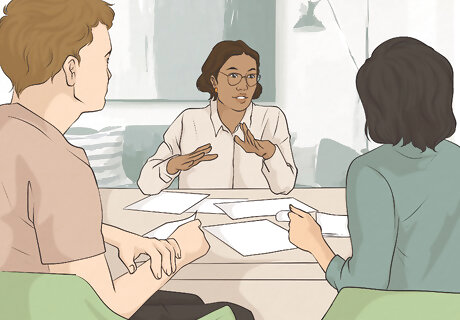
views
- Having education differences doesn't mean your relationship won't work, but if you have any concerns about your financial future or individual goals, talk to your partner about that early in the relationship.
- Overall, it's way more important to focus on things like your shared values and how you feel about each other.
- If you value education because it introduced you to new things, try sharing some of those with your partner so they can get the benefit of your knowledge.
- If you're still struggling, consider seeing a couple's counselor to help you work through any resentment or fears you may have.
Addressing Differences in the Relationship

Talk early about financial concerns. Research suggests that people with significantly different educational backgrounds take substantially different approaches to daily finances as well as socio-economic goals. Begin talking early about financial expectations to help keep your relationship focused on your connection, rather than the numbers. For example, when you go out for dinner or drinks, talk to your partner in advance about whether one of you will handle the bill, whether you will split it evenly, or whether you want to split it by item. If you live with your partner, sit down with them a few times a year to have conversations about your current financial situation. Discuss where you both are financially, what you are working toward, and what goals you each have for the future. Understand that there will be some things you and your partner may not agree on. The point of having a conversation is to understand where your partner is coming from, not to make them see things your way.

Set individual goals. A partner with a lower education level may want to pursue further education, or they may be happy with their current education and want to focus more on career or personal goals. Each partner should set individual goals for their life that they can clearly communicate with one another regarding their future. Let your partner know, “I do not want to pursue any further education, but I would like to work more developing a career that helps people.” Clearly communicating your expectations for yourself will help your partner understand what you want and how to best support you. Do not set goals or expectations for your partner. Those who allow their partners to choose their own path and support them as they are have the best chances at long term happiness in their relationship.

Foster empathy. Different education levels and differences in career are likely to bring about different ideas of what constitutes success and what constitutes failure. Instead of comparing your partner to your personal metrics, foster empathy within yourself and celebrate or be sad with them as they see fit. If, for example, your partner seeks a higher education while you work, take pride in their accomplishments like high marks on an exam and let them vent their frustrations about a difficult day with a professor. Approach your relationship with the idea that the two of you may have different problems, but that their joys and concerns are no less valid than yours. Be proud of your partner for their successes, whatever they may be.

Examine your negative feelings. If you feel resentment or a sense of discomfort caused by your educational differences, it may be helpful to talk about them openly and honestly with your partner. Before you have this conversation, however, ask yourself why you think you are having these feelings toward your partner. Remember that a person's level of education does not indicate their worth. If you feel that a difference in education is an issue in your relationship and is leading to resentment, you and your partner should try to understand why that is. When talking with your partner, use "I" statements to affirm how you feel, but try to avoid using "you" statements and casting blame. Listen openly and completely to your partner's responses. Allow this to be a discussion rather than an argument. Let your partner know that you are seeking understanding and compromise. Look to meet in the middle on these issues, with them acknowledging that your feelings are valid and you showing a willingness to work on addressing these problems together.
Enjoying Commonalities

Focus on shared values. You and your partner are likely together at least in part because you have some things in common. Make a daily practice of reminding yourself and your partner about your shared interests and values. Give your partner small daily compliments such as, "I love our relationship because we both care deeply about saving rescue dogs. I like that I can see that kind and compassionate side of you." Remember, education is just one element of your relationship. There are a lot of different ways you can connect outside of that.

Plan date nights. Set aside time for you and your partner to actively engage in things you both enjoy, whether that’s staying and watching movies or going out and enjoying the town. Talk with your partner and set aside time that’s dedicated to be just for the two of you to do something you both enjoy. While you might often have evenings where you end up watching movies or playing games together, it’s important to also set aside distinctive “date” time that is dedicated to enjoying your relationship. Plan your date out a little bit in advance with your partner. Talk about when you want to have your date night and what you both want to do. Try to make date night a regular thing. Aim to do it anywhere from once a week to once a month.

Introduce your partner to new things. Maybe you spent six years getting an advanced degree in Russian literature, or maybe you decided that you didn’t need years of school but you love restoring old motorcycles. Introduce your partner to things you love that they aren’t too familiar with. Be your partner’s guide. If you’re passionate about restoring old motorcycles, for example, walk your partner step-by-step through a specific part of the restoration process. Show and explain the process to them to help them understand more completely. Understand that your partner may or may not come to love your passions and hobbies the way you do, but that they will still appreciate them because they make you happy. When it comes time for your partner to introduce you to what makes them happy, give it a fair chance. It does not need to become your new passion, but try to enjoy and engage with it knowing that it is important to your partner.

Keep your chemistry alive. You are likely with your partner because you feel a connection with them both emotionally and physically. While sharing hobbies and having open discussions will go a long way in keeping the emotional connection alive, it’s just as important to keep the physical connection going. Be generous in your physical relationship with your partner. Make sure they are receiving what they need to completely enjoy their intimate time with you. Don’t be afraid to let your partner know what turns you on and what gives you the best results. Speak openly about your interests.
Seeking Outside Assistance

Keep friends and family close. Generally speaking, your friends and family are likely to have a similar education level to you, and it’s important to keep them close as a support network. When there is something that your partner struggles to empathize with or something you don’t feel comfortable talking to your partner because of your varied background, turn to your support system. Be open and honest with your partner about what is going on in your life. Do not, however, rely on them to provide all of your emotional and mental support. If there is an issue that your partner is not equipped to handle, talk to someone else in your support system. Likewise, don’t be afraid to tell your partner if there is an issue you cannot address. If, for example, your partner is working on publishing a monograph and you’ve never been through the publication process before, suggest that they get coffee with one of their colleagues who has already published.

Look at couple’s counseling. Counseling can benefit even the happiest and healthiest of relationships by giving couples a space for each partner to be heard. Work with a couple’s counselor on addressing any ongoing issues caused by educational difference in your relationship. Look specifically for a counselor that specializes in working with couples. You can determine this by looking at profiles online or speaking with the counselor’s office over the phone before an appointment. Talk to your counselor about what you both want to get out of counseling, whether that is to address a specific issue or simply to strengthen your relationship overall. Counseling is often work. Be prepared to attend weekly or bi-monthly appointments on a regular basis as a pair.

Seek out a financial planner. If you are afraid that a difference in education is going to translate into difference in financial means, bring in a financial planner as an impartial third party. A good planner can help you create a financial plan that takes both of your individual situations into account and works to further the relationship. Research your planner well in advance. Look online for planners that specialize in working with individual households and with customers of different financial backgrounds. Alternatively, some financial planning firms offer workshops on areas like investment planning and budgeting to help you and your partner get started. Check with local firms to see if any new courses are available for the two of you.


















Comments
0 comment